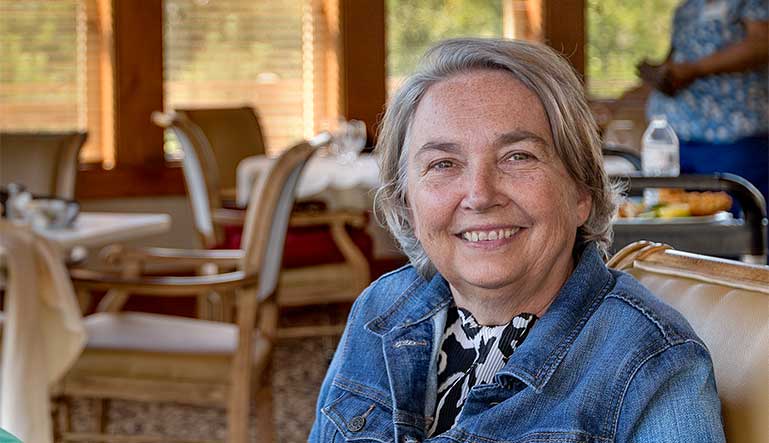Practicing gratitude can significantly enhance happiness and overall well-being in later life. Gratitude involves intentionally focusing on the positive aspects of life, acknowledging the good things you have, and expressing appreciation for them. Whether you’re an older adult seeking to enrich your life or a loved one looking to support a senior, understanding the transformative power of gratitude can open the door to a more joyful and fulfilling lifestyle.
In This Article
- The Relationship Between Gratitude and Happiness
- Health Benefits of Gratitude for Seniors
- How to Practice Gratitude
- Finding Gratitude and Happiness in Senior Living
The Relationship Between Gratitude and Happiness
According to a study by Positive Psychology, gratitude and well-being are just states of mind. When seniors practice gratitude, they experience a shift in perspective, focusing more on the positive aspects of life. This mindset fosters greater emotional resilience, improved relationships, and an overall sense of contentment.
Similarly, research from Harvard Medical School reveals that individuals who express gratitude regularly report higher levels of happiness and lower rates of depression.
For seniors, embracing gratitude can provide a renewed sense of purpose, helping them appreciate their experiences, relationships, and achievements.
Health Benefits of Gratitude for Seniors
Beyond emotional well-being, gratitude offers tangible health benefits for older adults, including the ability to:
Reduce Depression and Anxiety
Gratitude helps lower the level of cortisol, often called the “stress hormone” in the blood, promoting relaxation and reducing depression. Seniors who practice gratitude experience better emotional balance, increased resilience, and a greater ability to tackle daily problems with a calm and positive mindset.
Enhance Physical Health
Grateful seniors often enjoy improved physical health, including better sleep quality and a stronger immune system. According to a study published in The Journal of Positive Psychology, keeping a gratitude journal can also significantly reduce blood pressure.
Boost Cognitive Function
Focusing on gratitude enhances memory and mental clarity. By practicing gratitude, seniors can experience improved cognitive performance, better decision-making, and greater mental sharpness, all of which support their ability to navigate daily tasks and maintain mental agility.
Foster Social Connections
Expressing gratitude strengthens social bonds, helping seniors build meaningful relationships with others. Gratitude fosters a sense of connection and reduces feelings of loneliness, promoting a more active and socially engaged lifestyle.
Increase Longevity
A gratitude-driven positive outlook has also been linked to increased longevity. Seniors who focus on gratitude tend to have healthier, longer lives, enjoy more fulfilling years with loved ones, and see improved vitality throughout their later years.
How to Practice Gratitude
Incorporating gratitude into one’s daily life doesn’t have to be complicated. Here are 6 easy ways to reflect:
- Start a Gratitude Journal – Each day, write down three things for which you are grateful. These can be simple moments, like a sunny day or a kind word from a friend.
- Express Gratitude to Others – Take the time to thank friends, family, or caregivers. A heartfelt “thank you” can deepen relationships and brighten someone’s day.
- Practice Mindful Gratitude – Spend a few moments each day reflecting on the positive things in your life. Mindfulness practices, like meditation, can enhance this habit.
- Create a Gratitude Jar – Write down things you are thankful for on slips of paper and collect them in a jar. Revisit them whenever you need a boost of positivity.
- Participate in Gratitude Circles – Join a group where members share what they’re grateful for. This fosters a sense of community and mutual support.
- Focus on the Present Moment – Gratitude flourishes when we appreciate the here and now. Engage in activities that give you joy, like reading, gardening, or spending time with loved ones.
By making gratitude a daily habit, seniors can enhance their emotional well-being and quality of life.
Finding Gratitude and Happiness in Senior Living
Senior living communities offer unique opportunities to foster gratitude and happiness by prioritizing residents’ physical and mental well-being. These communities create supportive environments where seniors can focus on positive experiences, build meaningful connections, and embrace a sense of fulfillment.
At Five Star Senior Living, gratitude and happiness are central to our Lifestyle Enrichment program, which is built around four main pillars of wellness: emotional, physical, intellectual, and community (EPIC). By fostering meaningful connections and promoting overall well-being, we help residents enjoy a life of connection and fulfillment.
Ready to experience the difference at Five Star Senior Living? Find a community near you to schedule a tour today.
Contact Us Today
"*" indicates required fields

